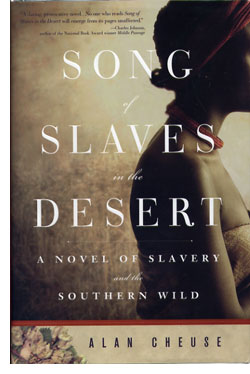 |
 |
 Alan Cheuse
Alan Cheuse
Song of Slaves in the Desert
Reviewed by: Rick Kleffel © 2011
Sourcebooks Landmark
US Hardcover First Edition
ISBN 978-1-402-24299-1
Publication Date: 03-01-2011
504 Pages ; $25.99
Date Reviewed: 07-21-2011
Index:
General Fiction
Fantasy
In his book reviews for NPR, Alan Cheuse speaks with a voice that is powerful and unique. In his fiction, he speaks with voices that are equally powerful, but not always his own. He becomes his characters to take us into their lives, no matter how remote they may from our own. 'Song of Slaves in the Desert' is a chorus of voices, one voice, one story, many stories, it is a song comprised of stories sung in many voices.
But for all the music in these words, all the joy and pain and art you'll find in here, be warned; this is also a compelling, propulsive, single-minded novel. It is a journey that that will take you to your destination far more swiftly than you will be able to imagine.
Cheuse is nothing if not ambitious. The book is divided into two different streams that eventually flow into one river of prose. Cheuse begins about as close to the beginning as you can, with scenes of geological age. These portions of narrative are sparsely poetic. We begin in Africa, with an indentured artisan's family and a carved stone. They flee from danger into slavery and from slavery into slavery as history unfolds. The story is fast paced, adventurous and fraught with emotion. Cheuse also offers some visionary passages that are striking and make fine use of elements of the fantastic.
Before we are out of danger, Cheuse introduces us in a second strand to Nathaniel Pereira, "A Hebrew of New York" as he calls himself. He tells his own story. It is sometime before the Civil War, and Nathaniel, a young man of some means, wants nothing more than to embark upon the European trip his father has promised him. But his father has other ideas, and asks Nathaniel to first journey to his uncle's plantation in South Carolina. Nate's uncle is a Jewish slaveholder. There are some problems, and Nathaniel's father sends his son to see if the business is worthy of investment. Upon his arrival, he experiences American slavery first-hand. But he also finds himself mesmerized by one of his uncle's slaves, Liza. It is the first step on a journey that Nathaniel never intended to take.
Cheuse writes the novel in two very different voices. The portions that follow a slave family through generations are told from a perspective that at first seems to be written in the third person, but gradually reveals itself to be something else entirely. The mystery of the narration itself is an effective plot point that lends these passages a feeling of earned poetry and real urgency. Nathaniel Pereira, on the other hand, is a young man rather taken with his own eloquence and unaware of his own inexperience. He thinks himself to be more mature and worldly than his actions prove him to be. Pereira is a very entertaining and straightforward first-person narrator, one who offers readers the pleasure of showing us more than he himself is able to see.
Cheuse challenges both himself and the reader with a large cast of characters. He succeeds by virtue of his plotting and his skills as a writer. The propulsive power of his generational slave plotline, weaves us in and out of characters who have powerful moments on stage to become family legends for the next generation. On the plantation, Cheuse simply creates memorable characters and by virtue of Nathaniel's wordy but entertaining prose, makes them quite clear. All of them are enjoyable to read about, even if they prove to be on the far side of despicable.
But for all the parts and persons, the characters and prose styles, the voices and visions you'll find in 'Song of Slaves in the Desert,' this is a very unified novel, with a rather breathtaking scope. And given the scope, the cast, the power of characters and their entanglements, the fact that Cheuse keeps us reading as fast as we can from beginning to end is every bit as remarkable as the rest of the novel. There's a lot of setup here and Cheuse delivers more than readers will expect. There are many voices, visions and songs in 'Song of Slaves in the Desert.' Cheuse is as much of a maestro as he is a writer, orchestrating story and character, plot and perception into novel that readers will remember as if they had experienced the events first hand. Ultimately, Cheuse speaks to us in our voice.
|
 |
|
|
 |
| |
Review Archive
All Reviews alphabetized by author.
General Fiction
Non-Genre, general fiction and literature.
Horror
Supernatural fiction, supernatural horror and non-supernatural horror.
Science Fiction
Science fiction, science fantasy, speculative fiction, alternate history.
Fantasy
Fantasy, surrealism and magic realism.
Mystery
Crime, thrillers, mystery, suspense.
Non-Fiction
Non-Fiction, True Crime, Forteana, Reference.
Poetry
|
|
 |
|




